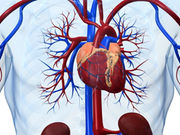Findings in out-of-hospital cardiac arrest patients without ST-segment elevation
WEDNESDAY, May 4, 2016 (HealthDay News) — Almost one-third of out-of-hospital cardiac arrest (OHCA) patients without ST-segment elevation (STE) require percutaneous coronary intervention (PCI), which is tied to a nearly twofold increase in the rate of favorable outcomes, according to a study published in the April issue of JACC: Cardiovascular Interventions.
Florence Dumas, M.D., Ph.D., from Paris Descartes University, and colleagues used the PROCAT database (2004 to 2013) to identify all 958 OHCA patients (STE and no STE) who underwent emergent coronary angiogram (CAG); percutaneous coronary intervention (PCI) was also required in some patients.
The researchers found that 73 percent of the 958 patients had no evidence of STE on the post-resuscitation electrocardiogram. In 29 percent of them (199 of 695), PCI was necessary. In patients with PCI, a favorable outcome was seen in 43 percent (87 of 200), compared with 33 percent of patients without PCI (164 of 495). Favorable outcomes were also predicted by a shorter resuscitation length (<20 minutes), an initial shockable rhythm, and a lower dose of epinephrine during resuscitation. The only independent indicator for PCI requirement was an initial shockable rhythm.
“These findings support the use of an invasive strategy in these patients, particularly in those resuscitated from a shockable rhythm,” the authors write.
Full Text (subscription or payment may be required)
Editorial (subscription or payment may be required)
Copyright © 2016 HealthDay. All rights reserved.








